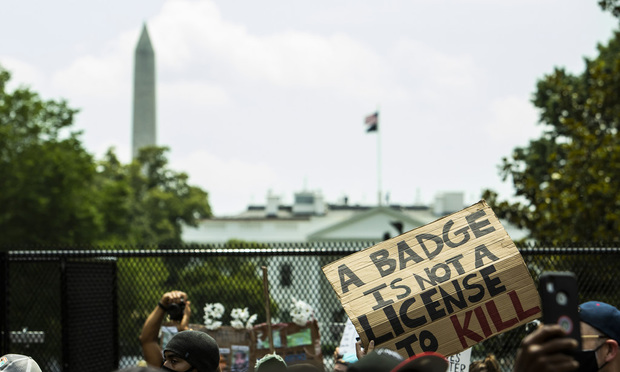Qualified Immunity: It's Turtles All the Way Down
It's time to do what the Civil Rights Act of 1871 should have been understood to do all along: hold law enforcement accountable for misconduct in the line of duty.
June 23, 2020 at 12:53 PM
5 minute read
 Thousands march in Washington, D.C., protesting police brutality and the killing of George Floyd in Minnesota at the hands of local police, on June 6, 2020.
Thousands march in Washington, D.C., protesting police brutality and the killing of George Floyd in Minnesota at the hands of local police, on June 6, 2020.
Earlier this month, Libertarian Rep. Justin Amash introduced the Ending Qualified Immunity Act. The bill, now co-sponsored by both Democrats and Republicans, would eliminate qualified immunity, a judicially created legal doctrine that protects many police officers from lawsuits brought by victims of excessive force. Ending qualified immunity is an important measure for increasing law enforcement accountability, and because the U.S. Supreme Court announced last week that it will not reconsider its qualified immunity decisions, the onus is now on Congress to act. But this task is an odd one because the Ending Qualified Immunity Act amends a law that never expressly included qualified immunity in the first place.
A police officer's use of excessive force is considered an "unreasonable seizure" in violation of the Fourth Amendment. The Constitution, however, does not specify how police officers, or others acting under state authority, are to be held accountable for depriving individuals of their constitutional rights. So Congress took up the task, creating a remedy in the Civil Rights Act of 1871 in the wake of the Civil War.
In what is now referred to as Section 1983, Congress imposed legal liability on anyone acting under the color of state law who deprives others of their constitutional or statutory rights. In other words, when a police officer like Derek Chauvin uses excessive force on a civilian like George Floyd, he is liable for his actions under Section 1983.
At least that is what the words of Section 1983 say.
But in the 1967 case Pierson v. Ray, the Supreme Court invented a legal doctrine that dramatically curtails Section 1983 liability. That doctrine is qualified immunity, and it appears nowhere in Section 1983's text. In Pierson, the Supreme Court determined police officers could not be liable under Section 1983 for making arrests under laws that are later deemed unconstitutional. Concluding otherwise, the court said, would require police officers to predict which state laws would become unconstitutional in the future and which would not. In the court's view, the police officers therefore ought to have qualified immunity from Section 1983 suits in the narrow set of circumstances where the constitutional validity of a law changes over time.
And where Pierson cracked the door to qualified immunity, the next 20 years of Supreme Court decisions would blow it open. The court landed on the formulation of the rule in force today in the 1987 case Anderson v. Creighton written by Justice Antonin Scalia. Anderson's qualified immunity rule says that "an official protected by qualified immunity" is only liable for a constitutional deprivation that violates "clearly established law." Under this test, an officer has qualified immunity unless "every reasonable official would have understood" the officer's actions violate the Constitution. In practice, to meet this burden, someone seeking relief under Section 1983 must show that an officer committed a constitutional violation nearly identical to one that a court has previously deemed unconstitutional.
For example, earlier this year, the U.S. Court of Appeals for the Fifth Circuit granted qualified immunity to a prison guard who pepper sprayed an inmate in his cell "for no reason." The court determined this was an unconstitutional use of excessive force. It then looked to prior cases to determine whether the guard's actions violated "clearly established" law. It noted cases establishing that punching an inmate for no reason, hitting an inmate with a baton for no reason, and tasing an inmate for no reason violate "clearly established" law. But it then concluded that these precedents did not clearly establish that using pepper spray on an inmate for no reason violates the Constitution. So, although the guard violated the inmate's constitutional rights, he was immune from the inmate's Section 1983 suit. This is a far cry from the original Pierson exception, which was limited to cases in which officers acted under presumptively valid laws. And it is an extraordinary departure from what Section 1983 actually says.
It never had to be this way. Pierson cited no statutory text or precedent in inventing qualified immunity, instead clinging to common-law principles that it insisted the Civil Rights Act of 1871 did not abrogate. Subsequent cases, each relying on the next, have piled faulty premise upon faulty premise to stray even further from the Civil Rights Act's text. The doctrine of qualified immunity, in other words, is turtles all the way down. As a result, plaintiffs are nearly as helpless, and officers are nearly as insulated, as they were without Section 1983.
With the 150th anniversary of Section 1983 fast approaching, it's time to do what the Civil Rights Act of 1871 should have been understood to do all along: hold law enforcement accountable for misconduct in the line of duty.
Orion de Nevers is a third-year law student at Georgetown University Law Center. He has worked in the Department of Justice's civil rights division, special litigation section, the office of the federal government responsible for investigating police misconduct.
This content has been archived. It is available through our partners, LexisNexis® and Bloomberg Law.
To view this content, please continue to their sites.
Not a Lexis Subscriber?
Subscribe Now
Not a Bloomberg Law Subscriber?
Subscribe Now
NOT FOR REPRINT
© 2025 ALM Global, LLC, All Rights Reserved. Request academic re-use from www.copyright.com. All other uses, submit a request to [email protected]. For more information visit Asset & Logo Licensing.
You Might Like
View All


Restoring Antitrust: Returning to the Consumer Welfare Standard
Trending Stories
- 1The M&A Partners Who Drove the Most Business as Deal Leads in 2024
- 2Judge Finds Trump Administration Violated Order Blocking Funding Freeze
- 3CFPB Labor Union Files Twin Lawsuits Seeking to Prevent Agency's Closure
- 4Crypto Crime Down, Hacks Up: Lawyers Warned of 2025 Security Shake-Up
- 5Atlanta Calling: National Law Firms Flock to a ‘Hotbed for Talented Lawyers’
Who Got The Work
J. Brugh Lower of Gibbons has entered an appearance for industrial equipment supplier Devco Corporation in a pending trademark infringement lawsuit. The suit, accusing the defendant of selling knock-off Graco products, was filed Dec. 18 in New Jersey District Court by Rivkin Radler on behalf of Graco Inc. and Graco Minnesota. The case, assigned to U.S. District Judge Zahid N. Quraishi, is 3:24-cv-11294, Graco Inc. et al v. Devco Corporation.
Who Got The Work
Rebecca Maller-Stein and Kent A. Yalowitz of Arnold & Porter Kaye Scholer have entered their appearances for Hanaco Venture Capital and its executives, Lior Prosor and David Frankel, in a pending securities lawsuit. The action, filed on Dec. 24 in New York Southern District Court by Zell, Aron & Co. on behalf of Goldeneye Advisors, accuses the defendants of negligently and fraudulently managing the plaintiff's $1 million investment. The case, assigned to U.S. District Judge Vernon S. Broderick, is 1:24-cv-09918, Goldeneye Advisors, LLC v. Hanaco Venture Capital, Ltd. et al.
Who Got The Work
Attorneys from A&O Shearman has stepped in as defense counsel for Toronto-Dominion Bank and other defendants in a pending securities class action. The suit, filed Dec. 11 in New York Southern District Court by Bleichmar Fonti & Auld, accuses the defendants of concealing the bank's 'pervasive' deficiencies in regards to its compliance with the Bank Secrecy Act and the quality of its anti-money laundering controls. The case, assigned to U.S. District Judge Arun Subramanian, is 1:24-cv-09445, Gonzalez v. The Toronto-Dominion Bank et al.
Who Got The Work
Crown Castle International, a Pennsylvania company providing shared communications infrastructure, has turned to Luke D. Wolf of Gordon Rees Scully Mansukhani to fend off a pending breach-of-contract lawsuit. The court action, filed Nov. 25 in Michigan Eastern District Court by Hooper Hathaway PC on behalf of The Town Residences LLC, accuses Crown Castle of failing to transfer approximately $30,000 in utility payments from T-Mobile in breach of a roof-top lease and assignment agreement. The case, assigned to U.S. District Judge Susan K. Declercq, is 2:24-cv-13131, The Town Residences LLC v. T-Mobile US, Inc. et al.
Who Got The Work
Wilfred P. Coronato and Daniel M. Schwartz of McCarter & English have stepped in as defense counsel to Electrolux Home Products Inc. in a pending product liability lawsuit. The court action, filed Nov. 26 in New York Eastern District Court by Poulos Lopiccolo PC and Nagel Rice LLP on behalf of David Stern, alleges that the defendant's refrigerators’ drawers and shelving repeatedly break and fall apart within months after purchase. The case, assigned to U.S. District Judge Joan M. Azrack, is 2:24-cv-08204, Stern v. Electrolux Home Products, Inc.
Featured Firms
Law Offices of Gary Martin Hays & Associates, P.C.
(470) 294-1674
Law Offices of Mark E. Salomone
(857) 444-6468
Smith & Hassler
(713) 739-1250









